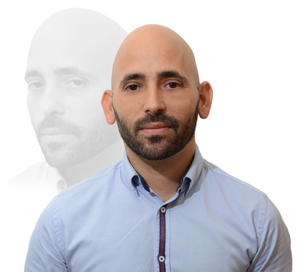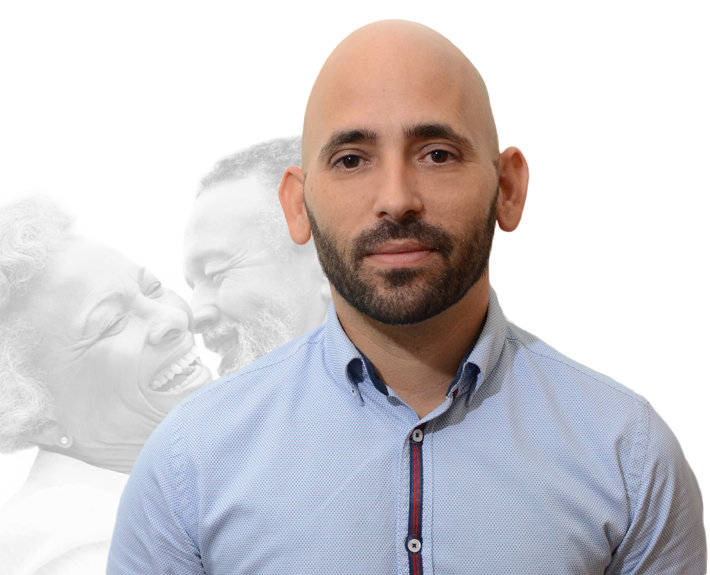“Old people don’t have problems… why would they need a psychiatrist?”
This is the type of derogatory comment that Dr. James Bratt has often had to deal with.
In a society that still regards psychiatry on the whole with a wary eye, a sub-specialty in the field is rare.
The only practicing psychogeriatricianDr. Bratt’s profession is unique to Trinidad and Tobago. He is the only practicing psychogeriatrician, also known as a geriatric psychiatrist, old age psychiatrist, or quite simply: a psychiatrist for seniors.
He sees people over the age of 60 with many forms of mental health problems including depression, anxiety, psychotic symptoms, panic attacks, and obsessive compulsive disorders. He also assesses people of any age with memory problems such as Alzheimer’s, the most common form of dementia.
To complement his medical practice, Dr. Bratt introduces his patients to new concepts in the management of mental health problems including a non-pharmacological approach. These include psychological interventions, nursing interventions, occupational therapy interventions, music therapy, art therapy, chair yoga, and memory exercises.
Medication that potentially can cause more harm than good“There are a whole host of things that can help individuals without resorting to medication that potentially can cause more harm than good — over-sedation, falls, increased cognitive impairment,” says Dr. Bratt.
“Most conditions are not curable, particularly among older populations, and the best approach of treatment is to find ways to help them to have the best quality of life possible.”
A Passion for the Elderly

Dr. James Bratt, MB, BCh, BAO, MRCPsych, MPH, has been around medicine and patients since a young age, as he comes from a family of doctors. These include his father, paediatrician Dr. David Bratt, and his sister, audiologist Dr. Natasa Bratt, both of whom currently share with him The Bratt Clinic location at Ranjit Kumar Street in St. James, north west Trinidad.
After leaving Trinidad to study Internal Medicine, General Surgery in Ireland and later Paediatrics in the United States; Dr. James Bratt travelled to the United Kingdom where he underwent three years of training in General Psychiatry followed by four years of sub-specialisation in Old Age (Geriatric Psychiatry). He also has a Master’s degree in Public Health, and is a member of the Royal College of Psychiatrists in the UK.
The older people don’t have anyone elseUpon his return to Trinidad in 2014, he at first sought employment in the public sector, but there were no opportunities in his particular field. He soon opened his own private practice to follow his passion of working with the elderly.
“My field is relatively new even in developed countries, but it would have been a shame to become a general psychiatrist after having gone through my specialist training,” he says. “We have great general psychiatrists here, but the older people don’t have anyone else.”
‘Let’s not make too much of an effort’As an old age psychiatrist, Dr. Bratt provides consultations and conducts medical tests to be able to make diagnoses and provide a course of treatment. He does not, however, provide therapy, but refers his patients to colleagues who provide various forms of therapy including psychology, physical therapy and occupational therapy.
“The caveat with dealing with older people is that sometimes patients don’t follow the recommended course of treatment because of the cost,” admits Dr. Bratt. “Despite the love and care within a family, sometimes there is an attitude towards older people, and sometimes even by the older people themselves — of ‘let’s not make too much of an effort’.”
Senior Citizens in T&T
Having trained and worked in the UK, Dr. Bratt notes that there is a significant difference between the elderly population in the UK versus in Trinidad and Tobago.
Older people being out and about and quite independent in the UK“In the UK there are many programmes such as Dial-A-Ride, a service where senior citizens can book a free taxi; on public transport there are sections clearly marked for older people; in urban areas such as London there are mini-groceries on almost every corner; and in general you just see older people being out and about and quite independent in the UK,” he says.
In Trinidad and Tobago it is not at that level, but the situation has certainly improved over the years, with services such as its Elderly and Differently-abled Mobile Shuttle Service (ELDAMO), and many discounts available to Trinidad and Tobago Association of Retired Persons (TTARP) members.
Dr. Bratt notes that in recent times there have also been efforts to include senior citizens in social activities. For example, there are 11 free Senior Activity Centres across the country under the Ministry of the People & Social Development, where activities such as music, yoga, crafts, aqua aerobics, dance, puzzles and crossword games are held.
They don’t want to bother to ‘fight up’Beyond these public programmes, there are also senior citizen day centres in the private sector that provide activities and occupational therapy for older citizens. However, the daily rate can often be too steep for senior citizens living on a pension.
“I’ve found that for some patients, from the time they hit 60 they don’t want to bother to ‘fight up’ to do things they used to do. After working in an office with structured days, they suddenly find themselves with little purpose in life, and if they do not find enjoyable activities, they can quickly decline,” says Dr. Bratt.
“Unfortunately, as they get older and voluntarily decrease their mobility, other problems can arise.”
Common Issues with Ageing
Problems associated with ageing vary among countries and among different cultures.
“In London, for example, the weather is cold and a lot of older people live long distances from their families, so I saw a lot of cases of depression,” Dr. Bratt explains.
“In T&T, however, I don’t see as much depression. We do however have other physical health problems — mobility problems, heart problems, memory problems and appetite problems, to name a few.”
Seeing a visual representation can helpPatience is one attribute that goes hand in hand with psychogeriatric psychiatry, and sometimes innovative measures are necessary.
Dr. Bratt uses visual models and props to explain conditions to his patients, in order to demonstrate the connection between heart health and brain health, the body’s reaction to vitamin deficiencies, and the effect of cholesterol and blood sugar on mental health.
“These are extremely useful for older patients,” he adds. “They may not remember all the literature they read, but seeing a visual representation can help.”
Another measure he practices is meeting with the patient’s family or support system, in order to provide a more holistic approach to his or her care. “For instance, I had one patient who had visual hallucinations and kept seeing men in the yard, which often led to an agitated quarrel with her husband and she got very upset,” he notes. “By just advising the husband to not argue with her but distract her by changing the topic, this was able to mitigate the situation.”
A Better Quality of Life
Beyond medical tests to determine diagnoses and treatment options, Dr. Bratt recommends having a retirement plan and budgeting for what the person finds most enjoyable.
Health is not only a tablet to make you get better“Too often, patients come in and I realise that their previous doctors have been over-medicating them — which is really not advisable for the elderly. Health is not only a tablet to make you get better,” he says.
“It is extremely important to keep physically active and mentally challenged and to fill your day with meaningful activities. Older people deserve to enjoy their lives just as much as younger people do.”
In the future, he hopes to see greater free or low-cost resources for older people, and community health services with doctors and nurses going to people’s homes, as many find it difficult to go to clinics and hospitals and can neglect their health.
Senior citizens’ rights to a better quality of life“The population of older people is growing every year, and will continue to do so,” he notes. “With advancements in medicine, we are all living longer, and we need the public healthcare systems to improve — subsidised retirement homes, home caregivers, pension increases, and much more.”
With his practice expanding to incorporate more activities and support groups for the elderly, he continues to advocate for senior citizens’ rights to a better quality of life.
“I chose to work with older people simply because I enjoy the company of older people, who have experienced a lot of what life has to offer and who realise that superficial things are at the end of the day meaningless,” says Dr. Bratt. “We all grow old, but only some people do it gracefully!”
Further Information
- Dr. Bratt currently offers Music Therapy for Dementia patients in his office, and he is hoping to start Art Therapy, Chair Yoga, Cognitive Stimulation Therapy and a Patient Support Group/Educational Programme – all specifically for Dementia patients.
- Dr. Bratt also organises free demonstrations of different types of therapy from time to time, to give patients an idea of what to expect.

